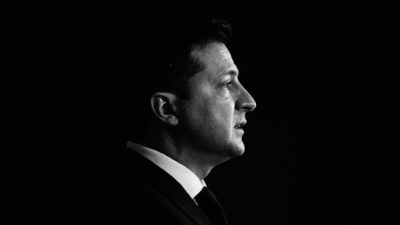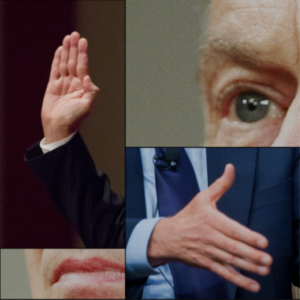Putin’s invasion of Ukraine highlights the importance of European Union membership — of a secure bloc that can fight together against external threats.
Watching Vladimir Putin’s war on Ukraine play out it seems he has vastly underestimated Ukraine, its president Volodymyr Zelensky and the West.
Putin seems to have expected to be welcomed by Russian-speaking Ukrainians as nostalgic for the Soviet era as he is, for Ukrainians to lay down their arms and for Zelensky to flee, all to be replaced by one of Moscow’s allies.
In this scenario Putin could then return his tanks Russia, annex a second chunk of Ukraine to follow Crimea, taken by force in 2014. He could declare his bogus “peacekeeping” mission over after a few days. He would take limited casualties, some painful but not devastating sanctions, and then it would all be back to business as usual.
Instead, Putin has found not just a President of Ukraine but a people thoroughly unwilling to return to Moscow’s orbit or surrender hard won freedoms. Ukrainians’ desire to be allied with the West, and to join both the EU and NATO at the earliest opportunity, is not a passing fad or something to be traded for peace on Putin’s terms. It has become central to their identity and, as made clear in daily interviews with Ukrainian citizens, something many are willing to die for.
For now, Zelensky and Ukrainian cities are holding out against Russian aggression, aided by gifts of Western armaments if not the no-fly zone or NATO troops they want.
As Putin has come to terms with the war not progressing on his terms, his tactics are becoming more brutal. But even if he does in the end take the cities and replace Zelensky with an acolyte, he will not be able to hold Ukraine with the minimal military presence he had planned, or with the tacit agreement of the West.
Putin may have felt he was on safe ground following the West’s effective indulgence of previous military adventures in Georgia, Crimea and Syria, and more recently the West’s abandonment of Afghanistan to the Taliban.
While the 2014 annexation of Crimea did result in sanctions and Russia’s expulsion from the G8, anger faded. Russia continued to play an active role in global diplomatic, sporting and financial relations.
The invasion of Ukraine is different. Its sheer scale, the fact it is taking place on the very borders of the EU and the Ukrainian people’s clear refusal to come quietly has belatedly awoken the West to the depth of the threat posed by Putin’s hostility.
The West’s indulgence of Putin’s aggression is over, as is its willingness to endure the consequences of his longstanding attempts to, in the words of one commentator, “successfully poison European politics by carefully bolstering anti-EU forces.”
Almost overnight, the West and the EU have begun to respond meaningfully to the threat Putin poses to Western security.
Almost all Putin’s former admirers in the West have distanced themselves from him. From Hungary’s Viktor Orban, France’s Marine Le Pen and Eric Zemmour, to even Donald Trump, all have denounced the invasion of Ukraine and the man behind it — mere weeks ago, they were willing to accommodate Putin’s views or speak admiringly of his leadership.
“Together with our European Union and NATO allies, we condemn Russia’s military attack,” said Orban last week, when barely a month ago he was describing Putin as “very good company” and boasting of regular audiences at the Kremlin.
In the space of a few days Putin has done what no amount of warnings from his opponents in the EU or US would ever have achieved: unity of purpose against him in the West, combined with meaningful policy changes in states including Germany, Switzerland, Finland and the EU itself.
They have pivoted to a new normal in which defence is a priority. Germany has for the first time agreed to send weapons to help defend another nation, and has allowed German-produced weapons sold to a third country to be sent on to Ukraine.
German Chancellor Olaf Scholz has committed to spend above the NATO target of 2% of GDP threshold on defence. “It is a new era,” he told the Bundestag. The additional funds will help establish Germany as a “reliable and capable partner” with an “appropriate” role in the NATO alliance.
His foreign minister, Annalena Baerbock, tweeted: “Our world is different after Putin’s war of aggression. While we are stunned by this breach of international law, we are not powerless. That’s why we will help the Ukrainian soldiers fighting for their country with anti-tank weapons and Stinger missiles.”
It is not just Germany. Finland, a member of the EU but not NATO, is sending weapons to Ukraine, abandoning its longstanding policy of neutrality. Along with Sweden, it attended a NATO conference over the weekend, an unprecedented event which brought warnings of “severe repercussions” from Russia should either apply to join the alliance.
Switzerland has abandoned its own neutrality, freezing Russian assets. It joined European neighbours in closing its airspace to Russian aircraft, except for humanitarian or diplomatic purposes.
The EU itself has become an active participant in the defence of Europe. It is for the first time funding weapons for Ukraine to help it defend itself against Russia’s invasion. The EU will spend €450m on weapons for Ukraine, a Commission source told Reuters, and a further 50 million euros on items such as medical supplies.
“For the first time ever, the European Union will finance the purchase and delivery of weapons and other equipment to a country that is under attack,” European Commission President Ursula von der Leyen said.
“Another taboo has fallen — the taboo that the European Union was not providing arms in a war,” said EU foreign policy chief Josep Borrell.
On sanctions too the West is going further than it did in 2014. The breadth and severity of sanctions is unprecedented, including a ban on transactions with the Russian Central Bank, the freezing of assets belonging to Putin and key figures in his administration, and restrictions on Russian banks, businesses and individuals. Some Russian banks have been removed from the Swift global interbank system.
The EU has banned Russian state-owned television network Russia Today and news agency Sputnik. Von der Leyen said this was to render them unable to “spread their lies to justify Putin’s war and to sow division in our Union”.
On refugee rights too there is a new normal. The EU as a whole has committed to welcome any Ukrainian citizen who crosses the border with no requirement for visas or asylum claims. They will be welcome for three years, able to access support, housing and work.
The outlier is the UK. Boris Johnson’s Government has been outspoken in its desire to see stringent sanctions imposed on Russia to turn back Putin’s aggression. Johnson to his credit was one of the first national leaders to push for Russian suspension from the Swift system, knowing the severe impact this would have on the Russian economy.
But the UK’s actions have not always met its rhetoric. The UK is second only to Switzerland as a chosen destination to stash Russian money. The Swiss have committed to freeze Russian assets.
Johnson has made characteristically grandiose claims: “There will be nowhere to hide ill-gotten gains,” he said last week. But while new rules are being discussed and are likely to come into force the same lack of ability to enforce them makes new rules as pointless as existing ones.
“Putting in place rules and then failing to allocate the resources needed to enforce them sends the signal that the UK is only serious about serious economic fraud and money laundering on paper, not in practice,” argues the Financial Times.
The UK is failing too on refugee rights. In contrast to the EU’s open offer the UK is offering no more than the right for family members to reunite with Ukrainians already in the country and existing access to seasonal worker schemes.
In practice the offers have little meaning: Ukrainians sheltering from Russian aggression have little chance of being able to apply for a visa. Even those who have got to the UK border in some cases find they are barred from entry.
Boris Johnson’s Government, wrote Gaby Hinsliff, has “misjudged the public mood on refugees” just as he “repeatedly underestimated the selflessness people would show during a pandemic”. Meanwhile, Russia Today still broadcasts in the UK, its licence undisturbed.
The rapid changes taking place across the Channel seem to be beyond the UK Government. Unlike Switzerland we cannot take swift action against Russian oligarchs’ money. Unlike the EU we will not open our doors to Ukrainian refugees. Unlike Germany we have no need to pivot to accept the need for hard power against opponents, but we cannot accept the idea of pooling military might with European allies to achieve greater security for all, at least not outside the US-led NATO alliance.
This conflict is not in the end about the UK or EU; it is about the brave men, women and children of Ukraine. But like any other continental conflict it will lead to changes in and between countries.
Brexit was always going to mean the UK watching the rest of Europe moving on without us. One impact of the war is a metaphorical fast forward button on European integration as a response to a raw and new awareness of shared destiny and shared need.
Britain is excluded in part due to the legal realities of Brexit — any EU sanctions, renewed integration or defence pact will be born without a British component.
But the British refusal to engage goes beyond legal constraints. A British prime minister seeking to help and to commit to shared protection would be welcomed. We are barred more because of the beliefs underlying Brexit, the British refusal to see the European project as others see it — not a mere trading bloc but a strategic alliance founded on moral purposes — “a framework of law and economic integration that locks democracy in and tyranny out.”
This moral purpose has been keenly expressed by Zelensky. Following his written application for Ukraine to join the EU he told the European Commission and Parliament: “We are fighting to be equal members of Europe. We are exactly the same as you are. So do prove that you are with us. Do prove that you are indeed Europeans and then life will win over death and light will win over darkness.”
Putin’s bombs ought to end Britain’s refusal to see the European project for what it is — at its heart a peace project, one that exists to prevent war between European powers and to protect them from external aggressors. But such recognition in the UK, after six and more years of being told that the EU was simply holding Britain back and that we would be stronger, better, richer alone, will be hard to recover.
We do not know how this war will develop. We can hope that it will be over in days, that a combination of sanctions plus diplomatic interventions from China, the US and others will bring the aggression to an end, to be replaced by meaningful talks that respect Ukraine’s right to self-determination.
But it may last far longer. If it does, what will that do to Britain’s sense of security? Hardly discussed in the Brexit debate was its impact on national security, yet talk to any security expert and they will explain patiently that the severance of security cooperation with European allies runs deep. The absence of British diplomats from every Brussels based security conversation makes that worse.
The economic harms of Brexit have, so far, failed to prompt a rethink. It may be that they have been too tangled up in pandemic chaos, or simply that the public have tired of arguments over GDP and trade volumes.
But a conversation about security, in a world where the aggressor feels uncomfortably close and the UK disturbingly isolated, may be another matter.
A British re-engagement with Europe, even if only on security and defence issues, would be of benefit to the UK and to the rest of Europe. We clearly bring expertise and experience, just as we would benefit from the expertise and experience of others.
It would also be the best way for the UK to be a true ally to Ukraine. Instead of treating this war as a conflict in a faraway land affecting people who are not our own — a belief underlined by Priti Patel’s closed-door policy to refugees — we should treat it as the rest of Europe is beginning to, an attack on one of our own, a European ally and a country and people that are an extension of us. We are all European, after all.


